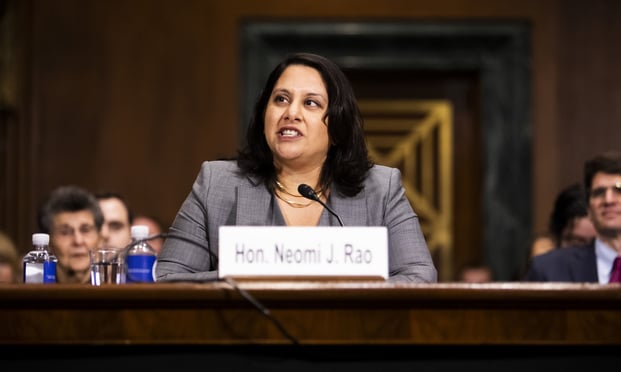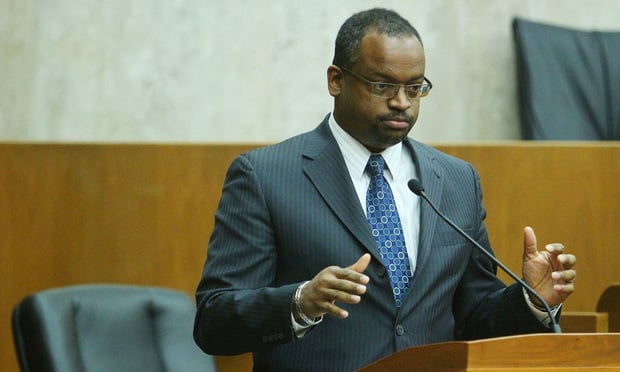Divided DC Circuit Orders Flynn Judge to Dismiss Prosecution at Trump DOJ's Request
In a dissenting opinion, Judge Robert Wilkins wrote: "It is a great irony that, in finding the District Court to have exceeded its jurisdiction, this Court so grievously oversteps its own."
June 24, 2020 at 10:23 AM
6 minute read
 Neomi Rao testifies before the Senate Judiciary Committee during her confirmation hearing to be U.S. Circuit Judge for the District of Columbia Circuit, on Tuesday, February 5, 2019. Photo: Diego M. Radzinschi/ALM
Neomi Rao testifies before the Senate Judiciary Committee during her confirmation hearing to be U.S. Circuit Judge for the District of Columbia Circuit, on Tuesday, February 5, 2019. Photo: Diego M. Radzinschi/ALM
Updated at 11:39 a.m.
The federal judge presiding over Michael Flynn's prosecution was ordered Wednesday to dismiss the case at the U.S. Justice Department's request, as an appeals court sided with the former Trump national security adviser's bid to shake his admission that he lied to the FBI.
A divided three-judge panel of the U.S. Court of Appeals for the D.C. Circuit said U.S. District Judge Emmet Sullivan lacks authority to undertake a review of the Justice Department's extraordinary decision to drop the case against Flynn, who twice pleaded guilty to lying about his past communications with the Russian ambassador to the U.S.
"This is plainly not the rare case where further judicial inquiry is warranted," Judge Neomi Rao said in the majority decision. "To begin with, Flynn agrees with the government's motion to dismiss, and there has been no allegation that the motion reflects prosecutorial harassment. Additionally, the government's motion includes an extensive discussion of newly discovered evidence casting Flynn's guilt into doubt."
Rao said Sullivan's plan to scrutinize DOJ "will result in specific harms to the exercise of the Executive Branch's exclusive prosecutorial power."
The dispute had teed up a clash over the power of trial judges, and under what circumstances courts can scrutinize the Justice Department's prosecutorial decision-making. Sullivan had set a hearing for July 16 on the Justice Department's move to abandon the prosecution.
The full appeals court has not said whether it will review the panel decision.
When the Justice Department moved to drop the case last month, Sullivan declined to immediately dismiss the prosecution, instead appointing a former federal judge to address his authority to review the government's decision and whether he should consider holding Flynn in contempt for walking back his acknowledgement, under oath, that he lied to the FBI about a conversation with the Russian ambassador to the U.S.
The former judge, John Gleeson, found that Flynn committed perjury in the court proceedings and recommended that Sullivan sentence him on his guilty plea rather than agree to dismiss the case. Gleeson, now a partner at Debevoise & Plimpton, said Sullivan should consider Flynn's alleged perjury at sentencing rather than hold contempt proceedings.
Many former federal prosecutors have applauded Sullivan's move to scrutinize the DOJ's maneuvering in the case, which many had said was done to benefit an ally of Trump. Republican state attorneys general and the National Association of Criminal Defense lawyers filed briefs backing Flynn, represented by former prosecutor Sidney Powell.
 Judge Robert Wilkins of the District of Columbia Circuit. Credit: Diego M. Radzinschi / NLJ
Judge Robert Wilkins of the District of Columbia Circuit. Credit: Diego M. Radzinschi / NLJIn a dissenting opinion, Judge Robert Wilkins wrote: "It is a great irony that, in finding the District Court to have exceeded its jurisdiction, this Court so grievously oversteps its own."
"This appears to be the first time that we have issued a writ of mandamus to compel a district court to rule in a particular manner on a motion without first giving the lower court a reasonable opportunity to issue its own ruling," he added.
Wilkins said in his dissent: "This is no mere about-face; it is more akin to turning around an aircraft carrier."
Sullivan was represented in the trial court and D.C. Circuit by veteran litigator Beth Wilkinson. She had urged the D.C. Circuit not to short-circuit Sullivan's review. Any ruling from Sullivan on the Justice Department's motion to dismiss could be later reviewed, in more routine course, at the D.C. Circuit, Wilkinson argued.
Rao was joined in her opinion by Judge Karen L. Henderson, who had suggested in arguments earlier this month that she was reluctant to step into the Flynn case—at least at its present juncture—and order its immediate dismissal. Calling Sullivan an "old hand" and "excellent trial judge," Henderson said it would be a "drastic remedy" to order the judge to halt his review.
"I don't see why we don't observe regular order and allow him to rule," Henderson said.
Referring to the July 16 hearing Sullivan scheduled, Henderson said, "There's nothing wrong with him holding a hearing, as far as I know."
The retreat from the Flynn case—just months after Attorney General William Barr overruled career prosecutors to recommend a more lenient sentence for Roger Stone—fueled concerns about the Justice Department losing its customary independence under the Trump era.
The D.C. Circuit panel's ruling came the same day one of the career prosecutors involved in Stone's case, Aaron Zelinsky, was set to appear before the House Judiciary Committee at a hearing focused on the politicization of the Justice Department.
In his opening remarks, Zelinsky plans to tell lawmakers that he and other prosecutors were told to reduce their initial sentencing recommendation for Stone, a longtime Trump ally, because the acting U.S. attorney in Washington at the time was "afraid of the president."
Read the D.C. Circuit's decision below:
Read more:
Jonathan Kravis, Prosecutor Who Opposed Barr in Stone Case, Joins Munger Tolles
Michael Flynn Should Be Sentenced for Lying to FBI, Court-Appointed Amicus Tells Judge
Don't 'Short-Circuit' Flynn Proceedings, Judge Emmet Sullivan Tells DC Circuit
No 'Rubber Stamps': Emmet Sullivan Has Long Defended Power of Federal Judges
24 Former Federal Judges Support Emmet Sullivan in Flynn's DC Circuit Challenge
Flynn Judge Emmet Sullivan Hires Veteran Trial Lawyer Beth Wilkinson
Barr's Move to Drop Flynn Case Puts Spotlight on 1977 US Supreme Court Ruling
This content has been archived. It is available through our partners, LexisNexis® and Bloomberg Law.
To view this content, please continue to their sites.
Not a Lexis Subscriber?
Subscribe Now
Not a Bloomberg Law Subscriber?
Subscribe Now
NOT FOR REPRINT
© 2025 ALM Global, LLC, All Rights Reserved. Request academic re-use from www.copyright.com. All other uses, submit a request to [email protected]. For more information visit Asset & Logo Licensing.
You Might Like
View All
DC Circuit Rejects Jan. 6 Defendants’ Claim That Pepper Spray Isn't Dangerous Weapon

Supreme Court May Limit Federal Prosecutions Over 'Misleading' but True Statements

US Judge OKs Partial Release of Ex-Special Counsel's Final Report in Election Case
3 minute read
11th Circuit Rejects Trump's Emergency Request as DOJ Prepares to Release Special Counsel's Final Report
3 minute readLaw Firms Mentioned
Trending Stories
- 1‘The Decision Will Help Others’: NJ Supreme Court Reverses Appellate Div. in OPRA Claim Over Body-Worn Camera Footage
- 2MoFo Associate Sees a Familiar Face During Her First Appellate Argument: Justice Breyer
- 3Antitrust in Trump 2.0: Expect Gap Filling from State Attorneys General
- 4People in the News—Jan. 22, 2025—Knox McLaughlin, Saxton & Stump
- 5How I Made Office Managing Partner: 'Be Open to Opportunities, Ready to Seize Them When They Arise,' Says Lara Shortz of Michelman & Robinson
Who Got The Work
J. Brugh Lower of Gibbons has entered an appearance for industrial equipment supplier Devco Corporation in a pending trademark infringement lawsuit. The suit, accusing the defendant of selling knock-off Graco products, was filed Dec. 18 in New Jersey District Court by Rivkin Radler on behalf of Graco Inc. and Graco Minnesota. The case, assigned to U.S. District Judge Zahid N. Quraishi, is 3:24-cv-11294, Graco Inc. et al v. Devco Corporation.
Who Got The Work
Rebecca Maller-Stein and Kent A. Yalowitz of Arnold & Porter Kaye Scholer have entered their appearances for Hanaco Venture Capital and its executives, Lior Prosor and David Frankel, in a pending securities lawsuit. The action, filed on Dec. 24 in New York Southern District Court by Zell, Aron & Co. on behalf of Goldeneye Advisors, accuses the defendants of negligently and fraudulently managing the plaintiff's $1 million investment. The case, assigned to U.S. District Judge Vernon S. Broderick, is 1:24-cv-09918, Goldeneye Advisors, LLC v. Hanaco Venture Capital, Ltd. et al.
Who Got The Work
Attorneys from A&O Shearman has stepped in as defense counsel for Toronto-Dominion Bank and other defendants in a pending securities class action. The suit, filed Dec. 11 in New York Southern District Court by Bleichmar Fonti & Auld, accuses the defendants of concealing the bank's 'pervasive' deficiencies in regards to its compliance with the Bank Secrecy Act and the quality of its anti-money laundering controls. The case, assigned to U.S. District Judge Arun Subramanian, is 1:24-cv-09445, Gonzalez v. The Toronto-Dominion Bank et al.
Who Got The Work
Crown Castle International, a Pennsylvania company providing shared communications infrastructure, has turned to Luke D. Wolf of Gordon Rees Scully Mansukhani to fend off a pending breach-of-contract lawsuit. The court action, filed Nov. 25 in Michigan Eastern District Court by Hooper Hathaway PC on behalf of The Town Residences LLC, accuses Crown Castle of failing to transfer approximately $30,000 in utility payments from T-Mobile in breach of a roof-top lease and assignment agreement. The case, assigned to U.S. District Judge Susan K. Declercq, is 2:24-cv-13131, The Town Residences LLC v. T-Mobile US, Inc. et al.
Who Got The Work
Wilfred P. Coronato and Daniel M. Schwartz of McCarter & English have stepped in as defense counsel to Electrolux Home Products Inc. in a pending product liability lawsuit. The court action, filed Nov. 26 in New York Eastern District Court by Poulos Lopiccolo PC and Nagel Rice LLP on behalf of David Stern, alleges that the defendant's refrigerators’ drawers and shelving repeatedly break and fall apart within months after purchase. The case, assigned to U.S. District Judge Joan M. Azrack, is 2:24-cv-08204, Stern v. Electrolux Home Products, Inc.
Featured Firms
Law Offices of Gary Martin Hays & Associates, P.C.
(470) 294-1674
Law Offices of Mark E. Salomone
(857) 444-6468
Smith & Hassler
(713) 739-1250










